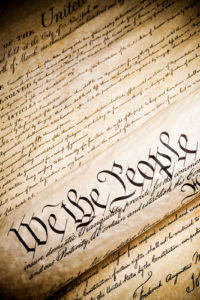The U.S. Constitution’s Preamble states that government must establish justice and promote the general welfare.

The Preamble reads in full:
In other words, the Constitution seeks to establish justice and promote the general welfare by specifying the fundamental laws of the nation. And the laws that the Constitution lays down strictly limit and enumerate the powers granted to the government. All powers not thus enumerated are left to the states and to individuals. It is the Constitution’s rule-of-law framework, under which the role of government is to be limited, and people are to be treated equally that ensures justice and the general welfare.
The Constitution does not dictate the nation’s economic system; we are not bound to be a capitalist society.
Amendments 4 and 5 provide explicit protections for private property:
Amendment IV
The right of the people to be secure in their persons, houses, papers, and effects, against unreasonable searches and seizures, shall not be violated, and no Warrants shall issue, but upon probable cause, supported by Oath or affirmation, and particularly describing the place to be searched, and the persons or things to be seized.
Amendment V
No person shall be … deprived of life, liberty, or property, without due process of law; nor shall private property be taken for public use, without just compensation.
Inherent in property rights is the right to use one’s property as one chooses – even if one chooses to employ it to make a profit.
Social Security and Medicare are just like private insurance plans.
No. Private insurance companies place their customers’ premiums in wealth-creating investments and then pay their claims from the profits.
Social Security and Medicare, by contrast, are pyramid schemes. Payroll taxes go to the Treasury where they are comingled with other government revenues and then spent. There is no meaningful investment. All claims are paid out of current revenue, borrowed money, or newly printed money. Both programs rely on increasing numbers of workers paying into the system to support retirees. And both programs are facing the same demographic problem as the ratio of workers to recipients drops. By 2034, it is expected that there will be only 2.0-2.3 workers per recipient.
Moreover, both Social Security and Medicare tax the young to subsidize the elderly. As a group, the elderly in this country are far wealthier than are the young. Taking money from the (relatively) poor and giving it to the (relatively) wealthy is not justice.
The U.S. needed central planning along with wage and price controls to win WWII.
The U.S. government largely left the arming of the country to private industry (see, for example, Freedom’s Forge: How American Business Produced Victory in World War II, by Arthur Herman).

We were able to outproduce our enemies in part because our industries were far less regulated than theirs and because businesses were often able to get around the regulations. For example, they overcame wage controls by offering benefits (e.g., retirement plans and health insurance) to the employees they needed.
Socialists often wax nostalgic about WWII. And, given their beliefs, it makes perfect sense. It was a time when people were united behind a government that was leading them toward a common goal. Wars and natural disasters send us to the bottom of Maslow’s Hierarchy (survival), so people’s aspirations get very basic. Given that, uniting people behind a common cause is simple.
In good times, however, people’s interests and priorities become diffuse. Hence socialists’ need for William James’ “moral equivalent of war” as a means of creating unity. As a result, we had one “war on <fill-in-the-blank>” after another. If there is no crisis to unite people, politicians will invent one.
Richard Fulmer worked as a mechanical engineer and a systems analyst in industry. He is now retired and does free-lance writing. He has published some fifty articles and book reviews in free market magazines and blogs. With Robert L. Bradley Jr., Richard wrote the book, Energy: The Master Resource.


READER COMMENTS
Thomas Lee Hutcheson
Aug 22 2022 at 11:31am
Social Security and Medicare are not a “pyramid scheme.” The are transfers financed by a tax on wages. It would be better if they were financed with a VAT.
The expenditures needed to win WWII wight have been financed with taxes with no price controls/rationing but the shifts in income that would have implied might have seriously undermined social solidarity needed to sustain those taxes. Personally, if I had it to do over, I would not risk the tax alone route.
vince
Aug 22 2022 at 4:41pm
“Social Security and Medicare are not a “pyramid scheme.” ”
It’s a pyramid scheme in that, with an aging population, fewer workers are paying more retirees. A better description may be Ponzi scheme.
Jim Glass
Aug 22 2022 at 7:34pm
Social Security and Medicare are not a “pyramid scheme.” The are transfers…
Three Nobel economists, two of them liberals, have used “Ponzi” to describe Social Security.
Paul Samuelson wrote in his Newsweek column titled “Social Security, a Ponzi Scheme That Works”, in 1967 …
Paul Krugman, pe-2000 version (before the pod was placed by his bed) wrote in the Boston Review in 1997:
Of course post-2000, pod-version Krugman spent a lot of time rowing that back …
And Milton Friedman famously called Social Security: The Biggest Ponzi Scheme on Earth.
Thomas Lee Hutcheson
Aug 23 2022 at 7:08am
In Ponzi schemes the people paying the taxes and the people receiving the transfers a) are in by law and so the “scheme” cannot fail when new people decide not to join and b) both taxpayers and benefit receivers can change the way taxes and benefits are set so there will be no “failure.” I’m not impressed by your appeals to authority who I think were just” being cute.”
It is of course true that a tax-transfer program that taxes wages is somewhat more subject to needing the formulas to be changed periodically becasue of demographic changes than one based on a VAT. It is a shame that the VAT hadn’t been invented back in the ’30’s and and we have allowed the current formulae to contribute to the structural deficit, which is bad for growth, but I don’t really see how the phrase “Ponzi scheme” drives understanding of this problem.
I even wonder if the popular mis-conception of SS as contributory savings does not discourage, just a little, independent saving for retirement and so would be another advantage of switching to a VAT.
Thomas Lee Hutcheson
Aug 22 2022 at 11:34am
I’ve never met a Socialist, (AFAIK, the species became extinct sometime in the ’50’s.) so I don’t know it they are “nostalgic” for WWII or not.
Jon Murphy
Aug 22 2022 at 5:01pm
Check out Cafe Hayek today.
Richard W Fulmer
Aug 22 2022 at 8:49pm
https://jacobin.com/
https://mltoday.com/
https://www.cpusa.org/
https://www.dsausa.org/
https://www.marxists.org/english.htm
https://marxistsociology.org/
https://university.marxist.com/en/
http://marxist.net/
https://www.wsws.org/en?redirect=true
https://www.marxistphilosophy.org/
http://www.usmlo.org/
https://www.socialist.net/
https://cosmonautmag.com/
https://socialistrevolution.org/
https://marxwalks.com/
https://marxiststudent.com/
Mark Z
Aug 22 2022 at 10:02pm
Extinct? There are several in congress and in my city’s city council (more than there are republicans in fact).
Thomas Lee Hutcheson
Aug 23 2022 at 7:12am
Are they Socialists or “Socialists” like Sanders who are just confused about what “Socialism” is? 🙂
Mark Z
Aug 23 2022 at 12:36pm
Have you read the DSA’s platform? I do them the charity of assuming they know what the word implies. If someone went around calling himself a ‘democratic fascist’ while occasionally insisting that they’re not ‘that kind of fascist’ (while defending regimes that are ‘that kind of fascist’), would you breathe a sigh of relief and say, ‘I guess they’re just confused about what that word means?’
vince
Aug 22 2022 at 12:24pm
“nor shall private property be taken for public use, without just compensation.”
Does anyone believe they are getting just compensation for their tax dollars? Not I.
Thomas Lee Hutcheson
Aug 23 2022 at 7:20am
“Just?” well no. Federal taxation is not progressive enough and had the crazy feature of taxing business income rather than the income of owners, which is quite unjust to owners with less than the maximum marginal tax rate.
Richard W Fulmer
Aug 23 2022 at 9:17am
Aren’t VATs, which you favor, regressive?
vince
Aug 23 2022 at 1:49pm
Taxation is just the revenue side. What do we get on the production side? Taxpayers pay government wages. I would like to see a requirement that government employees complete daily timesheets identifying what they actually did in a day to fill 8 hours of pay, and allow Congress to inspect those timesheets before budgets are approved.
Comments are closed.